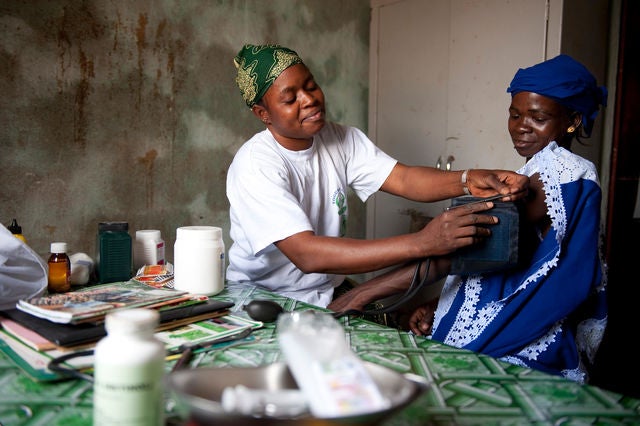Africa Health Agenda International Conference tackles threats to public health
Health leaders from across the continent gathered in Kigali to discuss how to improve health outcomes in the face of climate and economic pressures
Africa Health Agenda International Conference tackles threats to public health

The biggest threat to public health in Africa in the 21st century isn’t a virus, bacteria, or pandemic, said Africa CDC Acting Director Dr. Ahmed Ogwell Ouma, it is climate change.
Dr. Ouma made the remarks to health leaders from across the continent and around the world who had gathered this week in Kigali for the fifth annual Africa Health Agenda International Conference. The event included high-level meetings and workshops focused on improving health outcomes across the continent in the face of pressure from climate change and economic realities. The theme of this year’s conference was Resilient Health Systems for Africa: Re-envisioning the Future Now.
Rwanda’s Minister of Health Dr. Sabin Nsanzimana officially opened the three-day conference on Monday with a call to governments and stakeholders to invest in climate change mitigation, environmental protection, and resilient health services. “Our success relies on our renewed focus on epidemiology in public health in Africa. As public health professionals, we have a unique opportunity to get to the root of our communities and identify and address potential public health threats such as disease outbreaks, epidemics and pandemics,” Dr. Nsanzimana said.
This call was echoed throughout the conference including by luminaries such as Nigerian virologist Oyewale Tomari, who told attendees that African countries must invest in their own public health and research ecosystems, moving beyond “building capacity” to “retaining capacity,” and fight for equity, not beg for it.
The conference comes at a time when, as Dr. Githinji Gitahi, CEO of Amref Health Africa, explained in his remarks, health systems are challenges by four powerful forces he dubbed the “four Cs”: COVID-19 and the threat of other pandemics; conflict; rising costs; and climate change and disasters.
Conference plenary sessions highlighted the need for partnerships across the continent to share knowledge and other resources to strengthen health systems and the need for global solidarity to achieve global health security. One such partnership that is moving forward is the African Medicines Agency, which will harmonize approval for medicines across the continent – helping expedite access to new medicine. Chimwemwe Chamdimba, Head of Health at the African Union Development Agency, spoke to the conference about efforts to establish the agency and streamline approvals for drugs across the continent’s 55 member governments.
Other conference sessions included workshops and panels on sustainable pharmaceutical manufacturing in Africa; improving the quality of care; reaching zero-dose children; leveraging private sector capacity; strengthening epidemic preparedness and response; and adapting to climate change.
The lessons from the COVID-19 pandemic provided fodder for discussions across the three days of meetings; with speakers reminding those who had assembled that when it came to accessing vaccines and protective gear during the pandemic, Africa was pushed to the end of the waiting list.
Health leaders in attendance also called for African-led investments in health systems, workforces, medical manufacturing, and preparedness and response systems. The Africa CDC’s Dr. Ouma added that while he and other health leaders across the continent are optimistic about their ability to prevent and withstand the next global pandemic, this cannot happen without more investment in African-led solutions.
“We know that multilateral systems have not always delivered equitably for us, and the COVID-19 pandemic served as a poignant reminder of Africa’s ranking within the hierarchy of global health. While we acknowledge that African countries must also take responsibility for their role in under-investing in their health systems, we must also recognize that Africanled solutions to African challenges still require some level of global support because there can be no global health security if Africa continues to be left out,” said Dr. Ouma.
Another lesson from the pandemic, said Ethiopian Minister of Health Dr. Lia Tadesse, was the need for integration. Dr. Tadesse said governments needed to focus on strengthening health systems as a whole as opposed to looking at diseases as verticals. "We just need to invest in resilient health systems," she said.
The benefits, will prove transformative, said World Health Organization (WHO) Regional Director for Africa Dr. Matshidiso Moeti, who highlighted the urgent need for resilient health systems. "Healthcare investment is crucial for our economy, communities, and national security, not a mere financial burden on the social sector," she said.
How can we help you?
believes that the quickest path to improving health outcomes to identify positive outliers in health and help leaders implement lessons in their own countries.
With our network of in-country and cross-country partners, we research countries that have made extraordinary progress in important health outcomes and share actionable lessons with public health decisionmakers.
Our research can support you to learn about a new issue, design a new policy, or implement a new program by providing context-specific recommendations rooted in Exemplar findings. Our decision-support offerings include courses, workshops, peer-to-peer collaboration support, tailored analyses, and sub-national research.
If you'd like to find out more about how we could help you, please click . Please consider so you never miss new insights from Exemplar countries. You can also follow us on Twitter and LinkedIn.
